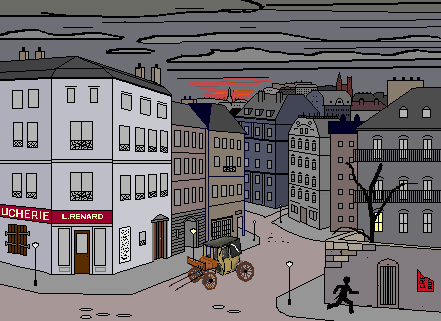Spadina Literary Review — edition 6 page 16
.../
Crémazie had imagined that the Prussians would not be so careless of international opinion as to deploy their Krupp canons to bombard Paris, which he considered “the capital of the civilized world.” But starting in early January the Prussians bombarded the capital of the civilized world every day and night. Their canons could reach the Latin Quarter, but not the Right Bank where Crémazie lived. Still, the bombardment brought the war to Crémazie’s doorstep in another way. One Saturday afternoon on Boulevard St.-Michel near the Luxembourg Gardens a shell landed 200 paces ahead of Crémazie, taking out a storefront and killing an elderly woman who was passing by. Crémazie hurried back to his room (his typical reaction), vowing to avoid the Latin Quarter for as long as the shelling continued.

They bombarded the capital of civilization
Octave Crémazie, erstwhile bard of the ancestor warrior heroes, now found war a wretched affair:
On the Boulevard de Sebastopol you encounter poor sobbing families dragging little wagons with their mattresses with their infants lying on top. They come to the Right Bank to find a refuge from King Wilhelm’s bombs. It’s a distressing spectacle to see, in this Siberian temperature, all these poor little infants shivering from hunger and cold, dragged along by their parents who go from house to house seeking shelter. I must say that everybody hastens to give them asylum. Our house has taken in its share of emigrants from the Left Bank. We have a poor woman, mad from pain: her eldest daughter, twenty years old, was cut in two, day before yesterday, by a shell that fell on their house and exploded in the room where the unfortunate victim happened to be. To save the four children that remain to her, she had to leave her lodgings. War is a horrible thing. When all you do is read the history of the conquerors, you easily get caught up in the dazzle of military glory. But once you’ve seen close-up the ravages and disasters caused by war, you wonder with fright what incalculable number of nameless miseries, of unspeakable pains, of dreadful deaths, are required for a conqueror to fashion what we are accustomed to call the victor’s crown.